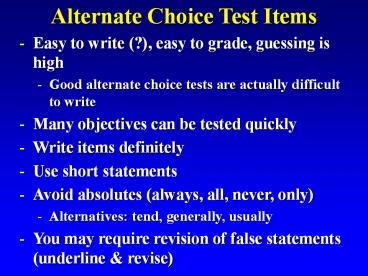Alternate Choice Test Items - PowerPoint PPT Presentation
Title:
Alternate Choice Test Items
Description:
... the extent to which a test item differentiates between students who do well and those who do not do well Quantitative Item Analysis The Discrimination Index ... – PowerPoint PPT presentation
Number of Views:132
Avg rating:3.0/5.0
Title: Alternate Choice Test Items
1
Alternate Choice Test Items
- Easy to write (?), easy to grade, guessing is
high - Good alternate choice tests are actually
difficult to write - Many objectives can be tested quickly
- Write items definitely
- Use short statements
- Avoid absolutes (always, all, never, only)
- Alternatives tend, generally, usually
- You may require revision of false statements
(underline revise)
2
Alternate Choice Test Items
- Trick questions are seldom appropriate
- Avoid double negatives
- Highlight or emphasize negatives
- Avoid double-barreled items
- Write approximately equal numbers of each
alternative - Keep statements the same approximate length
- Avoid a systematic order
- Avoid taking statements directly from the text
and placing them out of context - Use other symbols other than T/F, G/O, O/Q, N/M
3
Alternate Choice Test Items
- T F - High IQ children always get high grades
in school - Guns should not be outlawed unless they are never
fired - The Duroc is a red breed of swine with erect ears
4
Matching Test Items
- Easy to grade
- Appropriate for associations between facts
- Emphasize facts and memorization
- Problems when using many scan sheets
- Keep the list and descriptions short (8-12)
homogeneous - Arrange in a logical order
5
Matching Test Items
- Use plausible distractors
- Descriptions should be in the left column and
longer - Lists should be in the right column and short
phrases, words, or symbols - Descriptions should be numbers, lists lettered
- Include more options than descriptors instruct
as such
6
Completion Test Items
- Easy to write, easy to grade, guessing is low
- Many answers could be correct
- Refer to alternate choice rules
- Avoid grammatical clues
- Write items so there is a single word answer
- A question is usually better
- Omit only key words from statements
- Avoid awkward sentences
- Word so that the blank is near the end of the
sentence
7
Essay/Short Answer Test Items
- Easy to write, bears to grade, guessing is low,
bluffing is high - Also measure communication skills
- Write the items for specific answers
- Grade on evidence instead of opinion
- Avoid giving students options in answering
- Establish reasonable time page limits
- Grade using a scoring scheme
- Rubric
8
Multiple Choice Test Items
- Hard to write, easy to grade, guessing is
reasonable - Like alternate choice, items can become tricky
- Use longer stems than choices
- Use only one correct answer
- Use plausible distractors
- Avoid grammatical clues double negatives
- Avoid negative statements
- If used emphasize the negative
- Include 4-5 options Put in logical order
- Avoid None of the Above and All of the Above
9
Multiple Choice Test Items
- Red pigs with droopy ears are __________
- A. Hampshire
- B. Yorkshire
- C. Duroc
- D. Hard of hearing
- E. None of the Above
- F. All of the Above
10
Quantitative Item Analysis
- A numerical method for analyzing test items
(usually alternate choice, matching, or multiple
choice) - Difficulty Index (P) The proportion of students
who answered the item correctly - Discrimination Index (D) Measure of the extent
to which a test item differentiates between
students who do well and those who do not do well
11
Quantitative Item Analysis
- The Discrimination Index
- Positive Those who did well chose the correct
answer more than those who did poorly - Negative Those who did poorly chose the correct
answer more than those who did well - Zero No discrimination between those who did
well and poorly
12
Qualitative Item Analysis
- Are the items based on the objectives?
- Do the distracters distract?
- Is there only one correct answer?
- Or do the students have to find the MOST
correct answer?































